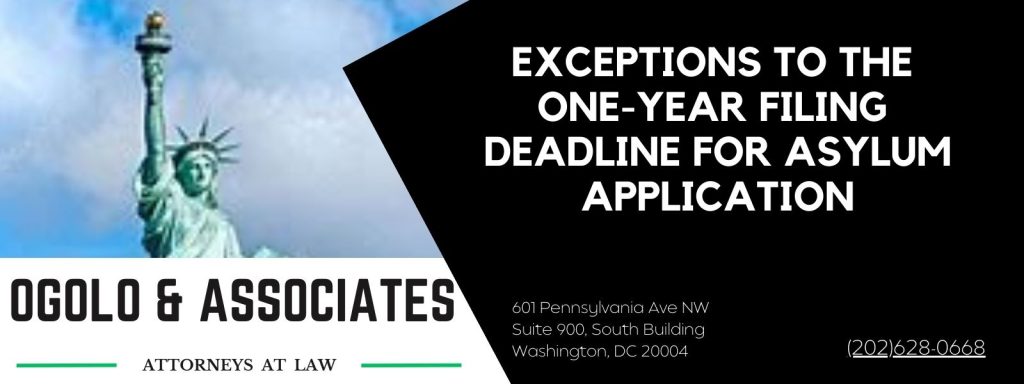If you are seeking asylum in The United States, you are required to file your application for Asylum within one year of your last. If you fail to meet the one-year filing deadline, the asylum officer cannot grant your application even if you represented, at your interview, a compelling case for asylum. The Asylum officer will not deny your application, but will refer you to the Immigration Court. Once you are referred to the Immigration Court, it means you are in removal proceeding. Though you can renew your application in the Immigration Court, if you fail to win your asylum, you may be deported. On the other hand, if you fail to win your asylum case, the Immigration may grant you Withholding of Removal. This option will allow you to remain in the United States with work permit privileges but will not lead to green card or citizenship.
CALCULATING THE ONE-YEAR FILING DEADLINE:
The one-year period is calculated from the date of last arrival in the United States. The date of arrival is counted as zero. The first day in the calculation is the day after the last arrival. For example, if your last arrival in the United States was on March 1, 2000, the one year period starts on March 2, 2000. If your one-year deadline falls on a weekend (Saturday or Weekend) or a public holiday, then the deadline falls on the next business day. It is important to note that your application is considered filed, not when you mailed it but when it was received by the United States Citizenship and Immigration Services.
PROOF OF WHEN APPLICATION WAS FILED:
If there is a question as to whether you complied with the one-year deadline, the burden is on the applicant (you) to prove that the application was filed within the deadline. The question is, how do you prove that you filed your application within the deadline. Though you can prove that you met the deadline by showing that you mailed your application within the statutory period, it is safer to mail your application to get their early enough to be received within the statutory period – the one-year deadline. It is critical that you make a copy of your application, send it by registered mail, return receipt requested. If you are running out of time, you are better off sending it by express mail to get there the next day and prove of mailing. You should also track your mail, print and keep a copy as proof that it was received on a specified day.
EXCEPTIONS/DEFENSES:
Since green card/citizenship is the ultimate goal in your asylum pursuit, there are many exceptions/defenses to the one-year filing deadline. If you find yourself in a situation where you missed the deadline for filing the application, you may claim any one of the following exceptions to the one-year filing deadline:
-
Changed Circumstances:
a. changed conditions in the applicant’s country of nationality after arrival or during the one-year deadline
b. changes in applicable United States Law
c. changes in the applicant’s circumstances, such as political activism outside the country of feared persecution, conversion from one religion to another, etc.
d. changes in the applicant’s spousal or parent-child relationship to the principal applicant in a previous application.
-
Extraordinary Circumstances:
a. events in the applicant’s life that caused the delay
b. serious illness or mental or physical disability, including any adverse effects of persecution the applicant suffered in the past/home country
c. the death or serious illness or incapacity of the applicant’s legal representative or a member of the the applicant’s immediate family
d. legal disability, this includes minors and mental impairment.
e. ineffective assistance of counsel
f. maintenance of legal status such as TPS or any other lawful status during the one-year period from the last arrival
g. initial attempt at submission of application within the one-year period from last arrival date. If you submitted your application within one year but it was returned by the USCIS.
FILING WITHIN A REASONABLE PERIOD AFTER THE DEADLINE:
Even though you can take advantage of these exceptions to the one-year filing deadline, you must file your application within a reasonable time after missing the deadline. If you fine yourself in this situation, do not give up, contact an immigration lawyer because it will not be easy to certify any of these requirements.
